#poetare
Text
Fiorirà la poesia del giovane Eric Blair
A molti potrà sembrare scontato e facilmente conseguenziale, e per certi versi lo è, perché negarlo, approdare a questa raccolta poetica di Orwell dopo aver terminato la lettura del suo romanzo “Fiorirà l’aspidistra”, in cui si narrano proprio le vicissitudini esistenziali e i tormentati processi interiori di un trentenne poeta inglese – il protagonista Gordon Comstock – alle prese con un’impari…
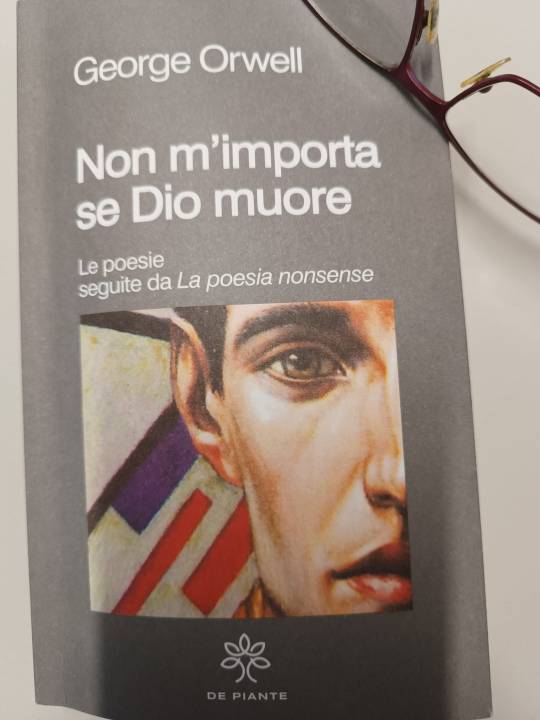
View On WordPress
#1984#capitalismo#comunismo#consumismo#distopia#fantascienza#Grande Fratello#libro#Orwell#poesia#poeta#poetare#poetry#raccolta#romanziere#romanzo#science fiction#speranza#web poetry
2 notes
·
View notes
Text

Xe come cagar
Sto ingenuo poetar,
Dopo sto mejo.
Son solo un gnampolo,
Scuseme voi veri…
BaoUtnaFèretWaka, 8 aprile 2024 - 6.09, Kontowood.
#baotzebao#valerio fiandra#haikyou#kontowood#ilrestomanca#ildopovita#wakabaotzebao#BaoUtnaFèretWaka#poetare#cacare#dialetto triestino#gnampolo#ingenuo
0 notes
Text
Premio d'Eccellenza "Città del Galateo" a Francesco Nigri con augurio al bell'amare
Premio d’Eccellenza “Città del Galateo” a Francesco Nigri con augurio al bell’amare
..
Il 6 ottobre scorso presso l’Hotel del Quirinale di Roma, nell’ambito dei Festeggiamenti del Decimo Anniversario dell’Associazione Culturale Internazionale VerbumlandiArt APS, si è svolta la Premiazione del “Premio Internazionale d’Eccellenza CITTÀ DEL GALATEO Antonio De Ferrariis”, organizzato da…

View On WordPress
#A Francesco Nigri il Primo Premio d&039;Eccellenza "Città del Galateo" per il libro IL SEGRETO DI EBE Sezione Libri Editi di Poes#adeguamento non significa abbandono bensì discernimento del buono e bello#adeguamento poesia alla contemporaneità#albatros il filo#approdo dinamico metrica poesia#autenticità del poetare del versarsi#belle poesie d amore#bellissime poesie d amore#capoversi maiuscole a capo doppi a capo#contemporaneità non significa cedimento ma co evoluzione#cosmica poesia facebook page#desiderio di contemporaneità#discontinuità sillabe estetica non forzata non ricercata grazia passione per la vita l amare l essere l essersi poesia#ebe divinità giovinezza#ebe mitologia#endecasillabi#evolversi musicalità linguaggi#fotografo matteo mignani#francesco lenoci#frasi poesie d amore#hebe munoz poetessa italovenezuelana#hotel colonna frascati#hotel del quirinale roma#IL SEGRETO DI EBE compie un anno | Francesco Nigri poeta e autore del libro di poesie IL SEGRETO DI EBE Edizioni Albatros Il Filo in Libreri#inclinaziona agli accenti#la più bella poesia d amore#lasciare libera l oralità interiorità della declamazione lettura a compenetrazione riflessione confronto#Le motivazioni del Primo Premio d&039;Eccellenza "Città del Galateo" per i Libri Editi di Poesia a Francesco Nigri organizzato da#le piu belle poesie d amore#libri di poesie d amore
0 notes
Text
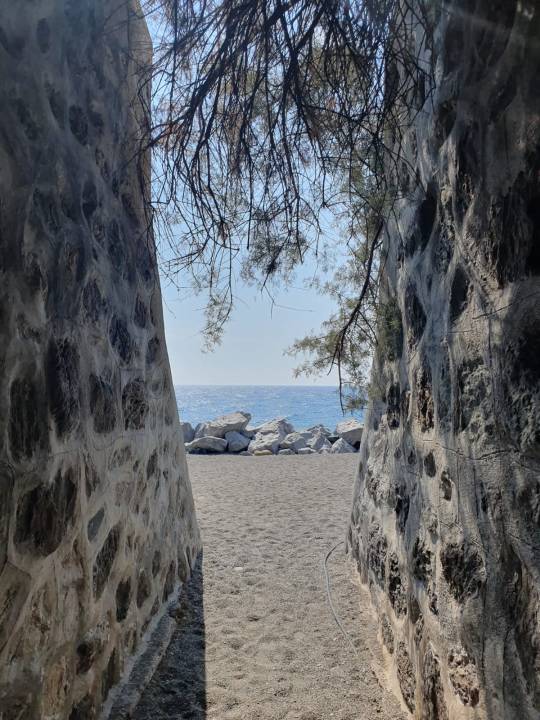
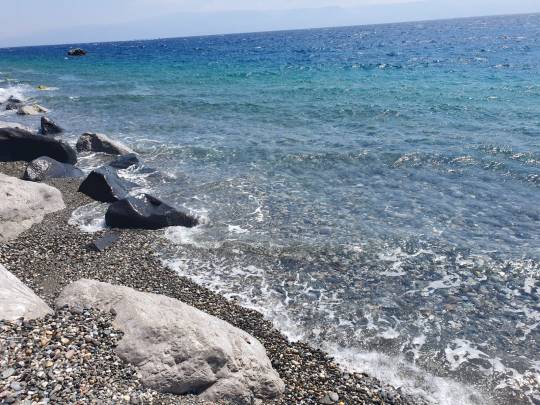
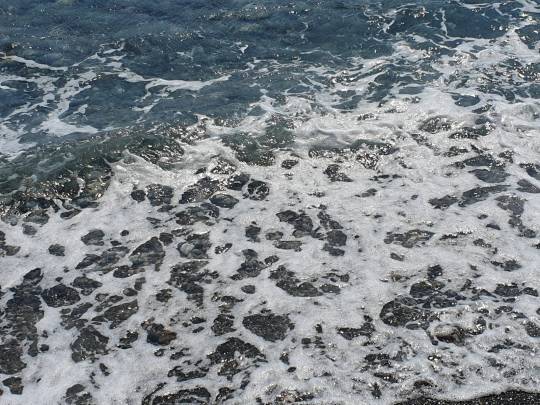


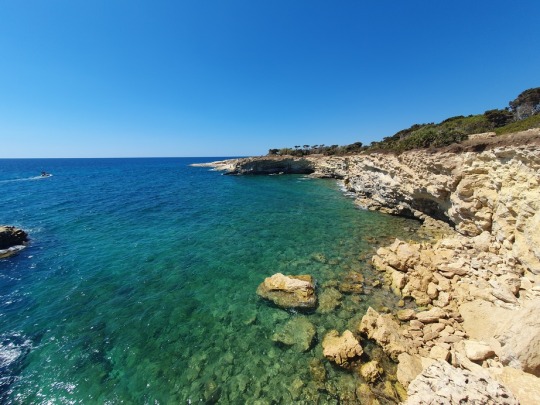



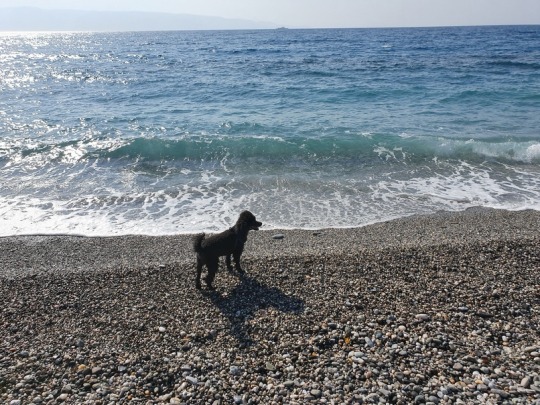
LA FAVOLA DEL MARE (da una lettura del filosofo Cacciari sula necessità della poesia).
Un ragazzo con un lento andare
cercava sulla riva del grande mare
il senso di quella distesa infinita
che sollievo dava alla sua vita
un senso si giusto, ma ben pesato
quando incontrò uno scienziato
che gli spiegò con fare dotto
cosa era il mar da sopra a sotto.
“Il mare è realtà non fantasia
è una riserva di energia,
il sole crea le nuvole bianche
loro corrono via mai stanche,
vanno nel mondo acqua a donare
con essa la vita fan germogliare.
L’acqua scende intensa o avara
diventa ora rivolo, fiumara
dona ricchezza gioia, dona vita
al mare torna mai stanca, sfinita!
Il mare quindi è energia infinita
una pila che mai è esaurita”
Il ragazzo ascoltava stupito
ma quanto detto dall’erudito
era giusto preciso, ma parziale,
era il noto, il vero il reale.
Continuò allora per la sua via
finché non trovò un gran dottore
della filosofia conoscitore
“Il mare esiste, come scienza dice,
della vita e origine e fattrice
alla terra, opposto lo penso
e dell’aria, molto più denso
ma con l’uomo non ha affinità
è acqua che va di qua e di là,
necessario per la sua utilità
però non ha nessuna santità,
è un oggetto non fondamentale
solo acqua, dei pesci e del sale
se ci chiediamo la sua necessità
capiamo che quindi non ne ha:
della natura e uno strumento
come la roccia o come il vento.”
Il ragazzo alla fine si allontanò
con pochi si e mille non so.
Mentre deluso sulla sabbia andava
vide un uomo che felice nuotava
Gli chiese “Scusa nuotatore
Tu che vi trovi gusto e sapore
dimmi del mare il significato
perché questo liquido manto
a guardarlo porta all’incanto
quale senso può mai avere
guardarlo e provar piacere?”
“il mare per quanto sia vecchio
Dell’anima di ognuno e lo specchio
lei lo guarda e vede dubbi, paure
sente le ansie quelle più dure
e quelle che sono meno vere
quelle false e quelle più sincere
e nel guardarle ne vede il confine
pesa quelle pure e quelle meschine
e capisce infine dove volgere la prua
in quale direzione è la sorte sua.
Questo lo capisci nell’esser poeta
non nello scrivere versi di seta
ma nel dare voce a quel che vede
l’anima tua, nel capir quanto crede
nel dar forma in modo sincero
a quel che è il tuo pensiero.
Per questo il gran mare è perfetto
perché cambia muta e l’effetto
di questo instancabile mutare
è un tuo continuo poetare.
Pensa alle albe quando si accende
e presto di blu tutto risplende
pensa alle tempeste, alla sua rabbia
che non potrai mai metter in gabbia
pensa al tramonto, il diventar quieto
e della luna esser l’amante lieto
Muta come l’animo nostro
ora è pace ora diventa mostro.”
Quando l’uomo ebbe finito
Il ragazzo lo guardò stupito
“Chi sei che ben hai definito
quanto scienziato ed erudito
non ha saputo voluto sviscerare
e per parte loro raccontare”
“Non sono un saggio o un profeta
come ogni uomo sono poeta
quanto non vedon scienza e filosofia
lo trova e lo dice la poesia”
THE TALE OF THE SEA (from a speech by the philosopher Cacciari on the need for poetry).
A boy with a slow walk, was looking on the shore of the great sea, the meaning of that infinite expanse, what relief it gave to his life, a correct but well-considered meaning, when he met a scientist, who explained to him with a learned manner, what it was the sea from above to below.
“The sea is reality not fantasy, it is a reserve of energy, the sun creates white clouds, they run away never tired, they go into the world of water to donate and with it they make life sprout. The water descends intensely or sparingly, now it becomes a trickle, the river gives richness, joy, it gives life to the sea, it never returns tired, exhausted! The sea therefore is infinite energy
a battery that is never exhausted"
The boy listened in amazement but what the scientist said was precise, but partial, it was what was known, what was true, what was real. He then continued on his way, until he found a great doctor, a connoisseur of philosophy
“The sea exists, as science says, of life origin and mother, to the earth, opposite, I think of the air much denser, but it has no affinity with man, it is water that goes here and there, necessary for its usefulness but it has no sanctity, it is a non-fundamental object
only water, some fish and some salt if we ask ourselves its necessity
we understand that it therefore has none: for the nature is an instrument like the rock or like the wind.”
The boy finally walked away with a few "yeses" and a thousand of " I don't know". While disappointed on the sand he saw a man who was swimming happily, he asked him "Sorry swimmer. You who find taste and flavor in it, tell me the meaning of the sea, because this liquid blanket, looking at it, leads to enchantment, what meaning can it possibly have, looking at it and feel pleasure?”
“the sea no matter how old it is, of everyone's soul it is the mirror, she looks at it and sees doubts, fears, feels the anxieties, the hardest ones, and those that are less true, the false ones and the most sincere ones, and in looking at them he sees the boundaries, weighs the pure ones and the petty ones and finally understands where to turn his bow and in what direction his fate lies. You understand this in being a poet, not in writing silken verses, but in giving voice to what your soul sees, in understanding what it believes, in sincerely giving shape to what your thoughts are. This is why the great sea is perfect, because it changes and the effect of this tireless change is your continuous poetry. Think of the dawns when it lights up, and soon everything shines blue, think of the storms, of its anger, which you will never be able to put in a cage, think of the sunset, the becoming quiet and of the moon being the happy lover Mute like our soul , now it's peace, now it becomes a monster.”
When the man finished, the boy looked at him in amazement.
“Who you are that you have well defined, as a scientist and scholar, he was unable to dissect, and for their part to tell”
“I am not a sage or a prophet, like every man I am a poet, what science and philosophy do not see, poetry finds and says”
33 notes
·
View notes
Text
Saudades de poetar... (poesia, 2024)
Saudade de escrever poesia
Sim, os exageros floridos
Mas o que seria da utopia
Não fossem profundos suspiros?
Então preciso de flores coloridas
As mais belas e perfumadas
Essas palavras tão queridas
Me lembram das pessoas amadas
Respire fundo nesse jardim
Feche os olhos com tranquilidade
Aqui a beleza só terá fim
Se assim for sua vontade
Aqui você sempre será bem vindo
Mesmo quando decidir pela quietude
Pois o jardim é um mundo infindo
Todos tem acesso à sua plenitude
10 notes
·
View notes
Text

Sonho que te quero sonhar…
Amor, que te quero amar…
Poesia, que te quero poetar…
Desejo, que quero desejar…
Boca, que quero beijar…
Sonho que estou a amar…
Amo, e me inspiro a poetar…
Poeto, e fico a desejar…
Desejo tua boca beijar…
Beijo que me faz sonhar…
Sonho que estou a te amar…
Amando, estou a poetar…
Poetando, sonho que estou te amando,
e tua boca beijando…
(Marcial Salaverry)
29 notes
·
View notes
Video
youtube
Father my fire| #The Poetar Space
4 notes
·
View notes
Text

gente, faz um minutão.
to aqui na agência meio sem inspiração, daí decidi ver quais das minhas contas na web ainda estavam ativas, e tchãram! achei meu tumblr, haha
o engraçado do tumblr é que várias vezes eu meio que depositei todas as minhas esperanças nele acreditando que seria a única rede (anti)social que eu iria manter atualizada sempre, mas pra variar, eu enjoo de tudo.
– faz dois dias que desativei o instagrão. to fazendo detox. me deixem.
e pra tirar a poetar grossa essa página aqui, essa foto é de ontem, durante uma impromptu walk por Point Loma a procura de um estúdio de tatuagem decente pra tatuar minha reverse blade sword. (acabei não fazendo, por sinal). MAS SEMPRE HAVERÁ O AMANHÃ
5 notes
·
View notes
Text
.🦋.
Se non scrivo di te
devo poetare del sole.
L’unica luce che mi può scaldare.
Tu prendi il mio pensiero
umile e vero,
e lo porti a sorvolare
infiniti cieli sopra il mare.
Se non volo con te
devo osservare
di un gabbiano bianco
l’andare,
in cerca di terra
in cerca di vita.
Tu sei la mia poesia.
L’unica musica che sento suonare
melodia che sà di gioia o di dolore,
strumento che vibra dentro il mio cuore.
Almina Madau
5 notes
·
View notes
Text
NaPoWriMo 5 More prompts to keep you writing each and every day.
First… a long but worthwhile quote:
“Lovers and madmen have such seething brains,Such shaping fantasies, that apprehendMore than cool reason ever comprehends.The lunatic, the lover and the poetAre of imagination all compact:One sees more devils than vast hell can hold,That is, the madman: the lover, all as frantic,Sees Helen’s beauty in a brow of Egypt:The poet’s eye, in fine frenzy rolling,Doth…

View On WordPress
#Author events#Bookstore Day#BookTree#Chris Jarmick#Jarmick#Literary events#NaPoWriMo#National Poetry Month#Poem a day#poetry#poetry is everything#Robert Dugnoi#writing exercises#writing prompts
0 notes
Text
La poesia di Promessa di Matrimonio di Francesco Nigri ad Hebe Munoz
La poesia di Promessa di Matrimonio di Francesco Nigri ad Hebe Munoz
Perchè tu sei il miracolo del sempre
..
Sono rinato così tante volteche conosco la paura ultimaquella dell’acqua sorgivache teme il fontarsil’affievolirsi del ricciolo all’arialo scorrersi dell’ultimosarò fresca d’artesia ancorasarò limpida del pelo libero delle goccesarò gustosa ancora del puroo tutto finirà così d’un salto…

View On WordPress
#accademia della lingua venezuelana#acqua carzeto#adeguamento non significa abbandono bensì discernimento del buono e bello#adeguamento poesia alla contemporaneità#alma llanera inno popolare venezuelano#approdo dinamico metrica poesia#artesia#autenticità del poetare del versarsi#bell amare#belle poesie d amore#bellissime poesie d amore#capoversi maiuscole a capo doppi a capo#casta diva norma vincenzo bellini#celebrato matrimonio tra poetessa italovenezuelana hebe munoz e poeta italiano Francesco Nigri#contemporaneità non significa cedimento ma co evoluzione#cosmica poesia facebook page#desiderio di contemporaneità#discontinuità sillabe estetica non forzata non ricercata grazia passione per la vita l amare l essere l essersi poesia#ebe divinità giovinezza#ebe mitologia#emozione#evolversi musicalità linguaggi#frasi poesie d amore#giornalista scrittore josè pulido#giovinezza acqua#I poeti Hebe Munoz e Francesco Nigri sposi: il libro di poesie del loro amore IL SEGRETO DI EBE proposto da Albatros Il Filo al Premio Streg#il segreto di ebe albatros il filo libro poesie d amore premio strega poesia#inclinaziona agli accenti#la più bella poesia d amore#La poesia di Promessa di Matrimonio di Francesco Nigri ad Hebe Munoz : il libro di poesie del loro amore IL SEGRETO DI EBE proposto da Albat
1 note
·
View note
Video
Nell’inizio del 1200 la Sicilia è un regno ricco e parte di un impero che andava da Tunisi fino alla Danimarca
Palermo era una capitale potente in cui Federico II aveva instaurato una corte forte nelle armi ed evoluta nella cultura, una cultura che non era formata solo dalla quella araba arrivata con i conquistatori nord africani sconfitti dal conte Ruggero ed ora erano sudditi di Federico, e neanche quella provenzale o francese discesa con i Normanni e con le popolazioni lombarde e piemontesi che li avevano seguiti. Era una cultura somma di queste due culture apparentemente opposte ed arricchite da quella bizantina ed ebrea. La stessa lingua, che di quella cultura era la forza, era una lingua unione ed evoluzione di tutti i popoli dell’isola a cui i guerrieri normanni avevano concesso di vivere e di pregare secondo la loro origine. L’amministrazione del regno infatti teneva conto di tutte le diversità che lo costituivano. Così ad esempio, vi erano notai Arabi, notai Ebrei e notai Latini che certificavano e regolavano la vita amministrativa dei privati e dello stato. Tra questi, vi era anche il notaio Jacopo da Lentini, il cui nome appare non solo nel registro notarile dell’epoca, ma anche in importanti atti amministrativi del regno. Essendo parte della forza amministrativa del regno, notar Jacopo era coinvolto anche nella gestione militare ricoprendo l’incarico di comandante della fortezza di Mazzarino. Per questo motivo i suoi contatti con la corte erano assidui e continui. Federico, contrariamente a molti nobili europei, aveva avuto una educazione multiculturale, con insegnanti arabi e latini. Per questo parlava diverse lingue, scriveva libri sull’uccellagione, poesie e ballate che a quel tempo avevano una grande importanza. Le poesie potevano essere imparate facilmente da qualsiasi suddito che non avesse istruzione ed erano uno strumento per veicolare sia le grandi gesta dei cavalieri, che l’amore o la protesta del popolo, la sua rabbia o le sue istanze politiche. Le ballate guidavano le danze dando ritmo ed eleganza ai movimenti di uomini e donne accompagnati dai pochi strumenti musicali di allora. I menestrelli ed i giullari componevano poemi e ballate d’amore secondo la cultura d’origine e l’esperienza dei singoli, spesso in modo ripetitivo e volgare o erudito ed ironico a seconda dei gusti di chi li ospitava. Molti di questi componimenti si concentravano sulla donna, che per i menestrelli e poeti arabi era una conquista, una preda da mostrare o un premio per le battaglie fatte per conquistarla. Per i menestrelli provenzali la donna era una madonna, una nobile dama degna del cavalier che la serviva. Per i poeti siciliani e per Jacopo da Lentini in particolare, la donna è la perfezione che l’uomo non ha; la donna è chi può dare nello stesso tempo la vita e la morte, è la compagna senza di cui il Paradiso stesso non può essere tale. Versi assoluti non per l’amore fine a se stesso, ma per la donna che si ama, versi per un sentimento dominante giustificati dal fatto che per Jacopo la donna è quanto manca all’uomo per aver pace, armonia e la pura bellezza. Jacopo anticipa la Beatrice di quel Dante che considerava i poeti siciliani dei maestri nell’arte del poetare e dell’amare (tutto ciò che gli italiani fanno in poesia, si può dire siciliano). Jacopo è anche il lato oscuro dell’amore, nell’impossibilità di essere amato per quanto si ama, nel dolore che nasce dalla difficoltà di poter rivelare e mostrare quanto di immenso si prova. Il sentimento è una tempesta che nessuno vede, è una forza invisibile impalpabile che attrae come quella di una calamita e a cui nessuno può sottrarsi, è un destino che non arriva mai a compimento. Per poter meglio dire quello che prova Jacopo crea una nuova forma di poesia, rivoluzionaria per quel tempo: il sonetto. Il sonetto forse non è altro che una ballata minore che si apre e che racconta con due quartine di versi e giudica e riassume con due terzine di versi finali. Le rime, vicine ed immediate battono un tempo che la metrica incalza facendo diventare il tutto efficiente ed elegante. Dante, Petrarca avrebbero usato il sonetto con tocchi e forme celestiali, Shakespeare avrebbe fatto raggiungere al sonetto vette ineguagliabili, Trilussa lo avrebbe trasformato in uno ironico schiaffo alla sua società di allora a dimostrare la straordinarietà di un mezzo che ha affascinato e aiutato migliaia di poeti a creare il loro cammino poetico. Noi conosciamo le opere di Jacopo grazie alla traduzione che ne fecero i poeti toscani nell’ italiano della loro epoca. I versi di Jacopo erano però scritti nel siciliano della corte di Federico, un siciliano evoluto che nella traduzione in italiano perde forza e freschezza. Ad esempio, nel tradure i poemi siciliani, i poeti toscani hanno dovuto inventare la famosa “rima siciliana” una rima che in italiano non lo è ma che lo sarebbe stata se fosse stata scritta in siciliano. Malgrado questa limitazione, le poesie di Jacopo ci raccontano l’eleganza di un tempo e la modernità di un sentimento dove l’amore non è un ideale ma una persona, dove i propri sentimenti sono l’eco della vita e, nello stesso tempo, una forza che ci innalza e ci abbatte, ci salva, ci distrugge, ci domina e che non riusciamo mai a saziare per come vorremmo o dovremmo. Questo era Jacopo da Lentini, notaio, burocrate, castellano e poeta, ai tempi del grande Federico Stupor Mundi.
In the early 1200s Sicily was a rich kingdom and part of an empire that ranged from Tunis to Denmark. Palermo was a powerful capital in which Frederick II had established a court strong in arms and evolved in culture, a culture that was not formed only by the Arab culture which arrived with the North African conquerors defeated by Count Roger and were now subjects of Frederick, nor the Provençal or French descent with the Normans and with the Lombard and Piedmontese populations who had followed them. It was a sum culture of these two apparently opposite cultures and enriched by the Byzantine and Jewish one. The language itself, which was the strength of that culture, was a language of union and evolution of all the peoples of the island to whom the Norman warriors had allowed to live and pray according to their origins. In fact, the administration of the kingdom took into account all the differences that made it up. Thus, for example, there were Arab notaries, Jewish notaries and Latin notaries who certified and regulated the administrative life of individuals and the state. Among these, there was also the notary Jacopo da Lentini, whose name appears not only in the notarial register of the time, but also in important administrative deeds of the kingdom. Being part of the administrative force of the kingdom, notar Jacopo was also involved in military management, holding the position of commander of the fortress of Mazarin. For this reason his contacts with the court were assiduous and continuous. Federico, contrary to many European nobles, had had a multicultural education, with Arab and Latin teachers. For this he spoke several languages, wrote books on fowling, poems and ballads that were of great importance at that time. Poems could be easily learned by any subject who had no education and were a tool to convey both the great deeds of the knights, and the love or protest of the people, their anger or their political demands. The ballads led the dances giving rhythm and elegance to the movements of men and women accompanied by the few musical instruments of the time. The minstrels and jesters composed love poems and ballads according to the culture of origin and the experience of the individuals, often in a repetitive and vulgar or erudite and ironic way according to the tastes of their hosts. Many of these poems focused on the woman, who for Arab minstrels and poets was a conquest, a prey to be displayed or a prize for the battles waged to conquer her. For Provençal minstrels, the woman was a madonna, a noble lady worthy of the cavalier who served her. For Sicilian poets and for Jacopo da Lentini in particular, woman is the perfection that man does not have; the woman is who can give life and death at the same time, she is the companion without whom Paradise itself cannot be such. Absolute verses not for love as an end in itself, but for the woman who loves herself, verses for a dominant feeling justified by the fact that for Jacopo the woman is what she is missing from the man to have peace, harmony and pure beauty. Jacopo anticipates the Beatrice of that Dante who considered Sicilian poets masters in the art of poetry and love (everything that Italians do in poetry can be said to be Sicilian). Jacopo is also the dark side of love, in the impossibility of being loved as much as he loves himself, in the pain that arises from the difficulty of being able to reveal and show how immense one feels. Feeling is a storm that no one sees, it's an impalpable invisible force that attracts like a magnet and that no one can escape, it's a destiny that never comes to fruition. In order to better express what he feels, Jacopo creates a new form of poetry, revolutionary for that time: the sonnet. The sonnet is perhaps nothing more than a minor ballad that opens and tells with two quatrains of lines and judges and summarizes with two tercets of final lines. The rhymes, close and immediate, beat a tempo that the metric presses, making everything efficient and elegant. Dante, Petrarca would have used the sonnet with celestial touches and forms, Shakespeare would have made the sonnet reach unparalleled heights, Trilussa would have transformed it into an ironic slap on his society at the time to demonstrate the extraordinary nature of a medium that has fascinated and helped thousands of poets to create their own poetic path. We know Jacopo's works thanks to the translation that the Tuscan poets made of them into the Italian of their time. However, Jacopo's verses were written in the Sicilian of Federico's court, an evolved Sicilian that loses strength and freshness in the Italian translation. For example, in translating Sicilian poems, the Tuscan poets had to invent the famous "Sicilian rhyme", a rhyme that is not a rhyme in Italian but would have been if it had been written in Sicilian. Despite this limitation, Jacopo's poems tell us about the elegance of the past and the modernity of a feeling where love is not an ideal but a person, where one's feelings are the echo of life and, at the same time, a force that lifts us up and knocks us down, saves us, destroys us, dominates us and that we can never satiate as we would like or should. This was Jacopo da Lentini, notary, bureaucrat, castellan and poet, at the time of the great Federico Stupor Mundi.
33 notes
·
View notes
Text

Sonho que te quero sonhar…
Amor, que te quero amar…
Poesia, que te quero poetar…
Desejo, que quero desejar…
Boca, que quero beijar…
Sonho que estou a amar…
Amo, e me inspiro a poetar…
Poeto, e fico a desejar…
Desejo tua boca beijar…
Beijo que me faz sonhar…
Sonho que estou a te amar…
Amando, estou a poetar…
Poetando, sonho que estou te amando,
e tua boca beijando…
(Marcial Salaverry)
14 notes
·
View notes
Text
Se te perguntam qual o segredo para poetar
Diga-lhes , de pronto , dileto poeta:
Diga-lhes, que nada mais é que perde-se no intenso brilho dos olhos...
dela
cintilantes, penetrantemente, "enigmáticos"
que te põe a perna bamba, o coração em descompasso!
que é ver-se absorto naquele imenso e charmoso sorriso.
que é a dor que pulsa dentro em si;
arrependimento de beijos não roubados.
0 notes
Text
Da quando hai lasciato le soglie dei miei cancelli gialli, s’è fatta più rabbiosa la mia bocca: non faccio altro che bestemmiare. È come se l’ombra di un’ossessa tranquilla si fosse impossessata della mia lingua rotta - che mi ritrovo a baciare labbra vuote - salto di bocca in bocca - non faccio altro che ciarlare. E più intima è la mia voglia, più silenziosa, più vorace. La mia pelle è ormai bianca, senza sangue, candida come la neve che bagna il tuo pesante abito invernale. Solevo essere e ricordare i teneri raggi d’aprile: ero il tuo sogno primaverile: ma adesso guardami. Oscura ombra settembrina. Ho perso il vigore nella violenta stagione dell’apatia, sono il ghiaccio in cui la mente tua riposa. Sono il solstizio perenne delle mie mani e nulla addosso mi si cuce. L’ago non penetra la pietra del mio viso: arabesco granito, chimerica ombra, sono l’eco assordante di questo verde giardino in cui il fantasma tuo riposa. Bifolca presenza ricciuta è il mio smorto poetare.
0 notes